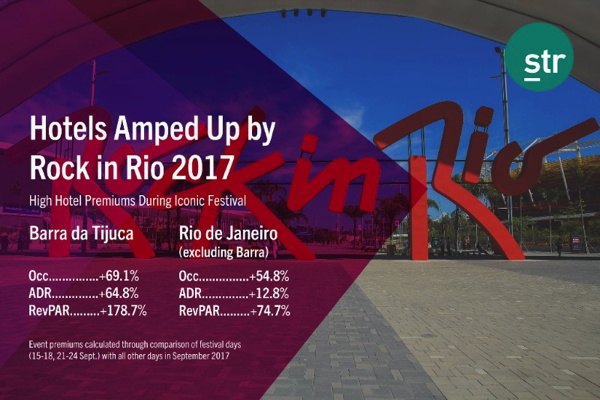Rio de Janeiro reported occupancy was 54.8% higher during the seven days of the September Rock in Rio music festival when compared to the rest of the month, according to STR.
Data from STR shows that hotels in Rio de Janeiro, Brazil, recorded substantial performance levels during the September Rock in Rio music festival.
During the seven days of the festival (15-17 and 21-24 September), occupancy in the Barra da Tijuca area of Rio, at an actual level of 81.4%, was 69.1% higher compared with the rest of September, while average daily rate (ADR) was 64.8% more at BRL555.77. Performance uplifts were common outside of Barra da Tijuca as well. Excluding Barra da Tijuca, Rio’s revenue per available room (RevPAR) was 74.7% higher compared with the rest of the month, with occupancy 54.8% higher and ADR 12.8% higher.

“A year after the Olympics, it’s encouraging to see Rio hotels benefit from another big event,” said Patricia Boo, STR’s area director for Central/South America. “Thanks to the festival, September was Rio’s first month of occupancy growth since August 2016. The 17.0% increase in weekend occupancy is a strong indicator of growth in leisure business.”
Through the first nine months of the year, Rio hotels have seen a 17.4% decline in occupancy to an actual level of 45.5%, due greatly to the immense build-up in supply for the 2016 Summer Olympics. Meanwhile, ADR has dropped 39.2% to BRL363.84, resulting in a 49.8% decline in RevPAR to BRL165.65. Despite these sharp declines, results for the month of September show some signs of recovery, with a 4.9% increase in occupancy.
STR analysts note that performance results for the month of September were better than expected, considering the recent waves of violence in Rio’s favelas. Despite these recent issues, Brazil’s federal government has revealed plans to drive tourism in the city, with investments of more BRL 1billion with partnerships from the private sector expected.
STR’s data sample in the hotel industry comprises more than 58,000 hotels and 7.8 million hotel rooms around the world. Pipeline data reported by STR is gathered from major chains, proprietary software, management companies and independent sources.
STR provides clients from multiple market sectors with premium, global data benchmarking, analytics and marketplace insights. Founded in 1985, STR maintains a presence in 10 countries around the world with a corporate North American headquarters in Hendersonville, Tennessee, and an international headquarters in London, England. For more information, please visit str.com.